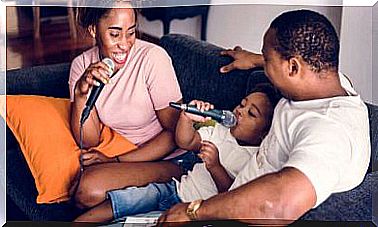What To Do With Children Who Talk Too Much In Class

If children talk too much in class, it is likely that they are not paying enough attention in school and their academic performance may suffer. Sometimes children are so eager to socialize that they forget to wait until break, lunch or other times when it is appropriate.
Nevertheless, talking in class is disruptive. It creates problems for the teacher and it can also distract other children in the class.
To know if your child talks too much in class, you need to communicate with his teachers all the time. This is not just a behavioral question or a purely social one, it is also an important trait in developing his listening ability.
Below are recommendations to help children realize that they should not talk at inopportune times. Your kids will also better recognize when they need to be attentive in class and focus on something.
How should a parent react if a child talks too much in class?
Find the reason why the child talks too much in class

To tackle this problem, you need to find out why your child tends to talk too much. This problem can become more complicated if not treated properly. Some of the most common reasons for talking in class include:
- Feeling that they are not getting enough attention from their teacher or classmates.
- Feeling demotivated during class because they need more challenging activities or activities that better suit their learning style.
- Difficulty understanding teacher’s instructions or teaching materials. The teacher’s writing on the blackboard can also be a problem.
- Feeling restless or needing to stretch or relax their muscles in order to focus again.
- Having no interest in the subject the teacher is teaching.
- Lack of assertiveness on the part of the teacher.
Practice modeling appropriate behavior for children who talk too much in class
If your kids talk too much in class, you can do exercises at home that will help improve their behavior at school. It is fundamental that you teach them to wait, to listen and to control their impulses.
Prevent your child from interrupting conversations and ask them to wait their turn to speak. A good opportunity to model this kind of behavior is to play a board game. Then ask him to patiently wait his turn to communicate.
Provide a calm environment at home
Any correction of your children’s behavior should be done in a respectful and courteous manner. Children feel less anxious and need less attention when there is a calm environment at home that is free from heated discussions and tension.
Also make sure there are no distractions that prevent children from focusing on their activities.
Make sure there are no vision or hearing problems in children who talk too much in class
In many cases, children who talk too much in class have difficulty hearing or seeing. The first thing to do is rule out any physical reason that influences children’s behavior at school.
After checking that the child’s health is normal, you can begin to think about how to intervene on a social level.
Teach children to follow the rules at home

One way to ensure that children abide by the rules at school is to have children comply with these rules at home as well. All children should be taught to respect standards. They also need discipline so that they become emotionally healthy adults.
Most importantly, be patient in implementing the rules and do it consistently. While it can be annoying to hear from the teachers that your child talks too much in class, it is a situation that can be remedied if you work together.
Finally , you need to support your children in adjusting to school life. This helps them learn to listen and get along better with their teachers. In addition, they learn to interact with others in a healthy way.









